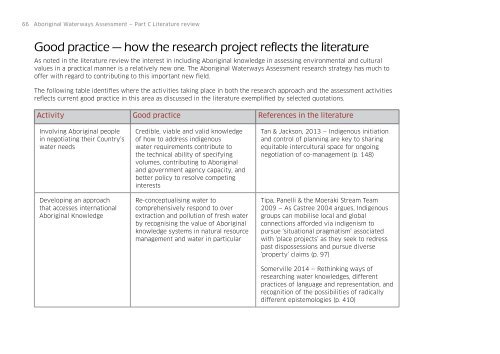Aboriginal Waterways Assessment program
dCckIF
dCckIF
Create successful ePaper yourself
Turn your PDF publications into a flip-book with our unique Google optimized e-Paper software.
66 <strong>Aboriginal</strong> <strong>Waterways</strong> <strong>Assessment</strong> — Part C Literature review<br />
Good practice — how the research project reflects the literature<br />
As noted in the literature review the interest in including <strong>Aboriginal</strong> knowledge in assessing environmental and cultural<br />
values in a practical manner is a relatively new one. The <strong>Aboriginal</strong> <strong>Waterways</strong> <strong>Assessment</strong> research strategy has much to<br />
offer with regard to contributing to this important new field.<br />
The following table identifies where the activities taking place in both the research approach and the assessment activities<br />
reflects current good practice in this area as discussed in the literature exemplified by selected quotations.<br />
Activity Good practice References in the literature<br />
Involving <strong>Aboriginal</strong> people<br />
in negotiating their Country’s<br />
water needs<br />
Developing an approach<br />
that accesses international<br />
<strong>Aboriginal</strong> Knowledge<br />
Credible, viable and valid knowledge<br />
of how to address indigenous<br />
water requirements contribute to<br />
the technical ability of specifying<br />
volumes, contributing to <strong>Aboriginal</strong><br />
and government agency capacity, and<br />
better policy to resolve competing<br />
interests<br />
Re-conceptualising water to<br />
comprehensively respond to over<br />
extraction and pollution of fresh water<br />
by recognising the value of <strong>Aboriginal</strong><br />
knowledge systems in natural resource<br />
management and water in particular<br />
Tan & Jackson, 2013 — Indigenous initiation<br />
and control of planning are key to sharing<br />
equitable intercultural space for ongoing<br />
negotiation of co-management (p. 148)<br />
Tipa, Panelli & the Moeraki Stream Team<br />
2009 — As Castree 2004 argues, Indigenous<br />
groups can mobilise local and global<br />
connections afforded via indigenism to<br />
pursue ‘situational pragmatism’ associated<br />
with ‘place projects’ as they seek to redress<br />
past dispossessions and pursue diverse<br />
‘property’ claims (p. 97)<br />
Somerville 2014 — Rethinking ways of<br />
researching water knowledges, different<br />
practices of language and representation, and<br />
recognition of the possibilities of radically<br />
different epistemologies (p. 410)


